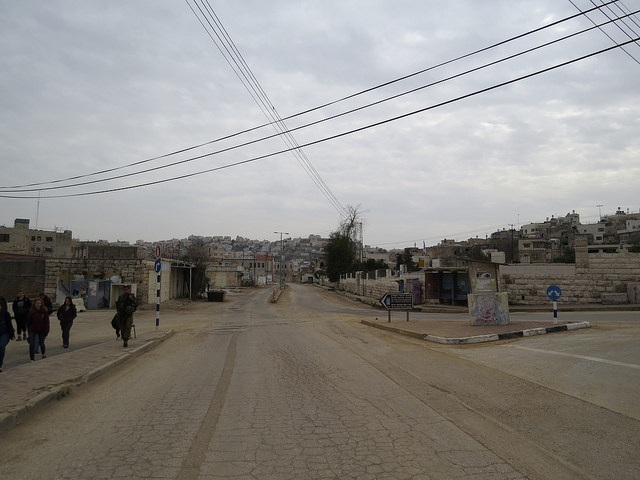10 February 2015
We’ve concluded our final week in Beit Sahour. This week has been full of last times: last time walking to the ATG (Alternative Tourism Group) in the morning, last Arabic class, and last meals with our host families. We started out the week watching a film called The 18 Wanted, a comedy/documentary about the people of Beit Sahour resisting Israeli Occupation via nonviolent actions. The film is artistic, entertaining, and has a strong call for justice. It is definitely worth watching. Other highlights include a visit to the Badil Center in Bethlehem to learn more about Palestinian refugee issues and legal status, going to the city of Nablus in the northern part of the West Bank, seeing the Pools of Solomon, stopping at Jacob’s well, and visiting a Samaritan community and learning about their religious and cultural practices today.
For many of us, our day at the Tent of Nations was one of the most powerful times of the trip. Tent of Nations is a farm that has been run by the same family since the time of the Ottoman Empire. All around the farm, Israeli Settlements are being built and the family is continually being pushed off the land that is legally theirs. On repeated occasions the family’s trees (apricot & olive) have been bulldozed during the night by Israeli soldiers, but the family lives by the motto “we refuse to be enemies” and instead of reacting in violence, they vow to plant two trees for every one the Israeli forces plow down. We as a group had the opportunity to help dig holes and plant trees on the property. It was a day of hard work but a welcomed sense of being able to do something, however small, to resist the oppression we’ve spent the last three weeks learning about.
-Rachel Bowman, junior
I’m sure I can speak for a lot of us when I write about how I personally feel leaving Beit Sahour. I’m ready to begin the next part of the journey, to be on the move and feel like a traveler again. But at the same time, I’m hesitant about leaving the many ways this place has been a comfort for me the last 3 weeks.
I’m going to miss the stability of a fixed schedule. Arabic class in the morning, lectures in the afternoon, and the occasional field trip to places of biblical or contemporary significance have been our typical daytime activities. But in the late afternoon when we split to walk home, whether we’re exhausted or contemplative or confused or wired as a response to whatever we learned or experienced that day, we had homes to go to. Families to nurture us in body and spirit, to help us verbally process or even sit in comfortable silence around a TV.
The Palestinian culture is one grounded by the concept of family. This definitely isn’t limited to blood relation – while any given person has many relatives in the area, the way in which they act toward anyone on the street makes them feel as though they might as well be one too. The people we’ve met serve as a perfect example of loving your neighbor, strange or familiar, as one of your own.
ATG has done a marvelous job at helping us experience this firsthand; too many tourists visiting the Bethlehem area hop off a bus, capture pictures and leave again without getting to know the people who live here and have lived here since the time the famous baby Himself was born, but the organization has provided an alternative approach to such visits. We’ve seen how this loving community is slowly shrinking and separating by the hands and the walls of the occupier, and we struggle when we think of what can be done to stop such blatant injustices.
Today, we leave our makeshift home that is the community of Beit Sahour. We cross the border all too smoothly to the side of the “other”, who we will get to know and hopefully love instead of subconsciously hate from the shielded viewpoint of those who are suffering. Deepening complexities will continue to challenge our idea of “comfort”, but I hope and pray that we’ll continue to find it not tied to location, but instead to the hearts of humanity – through these seemingly miniscule instances of love that exist in every one of us. And I think I can speak for all of us when I ask you to do the same.
-Sam Swartzendruber, junior

